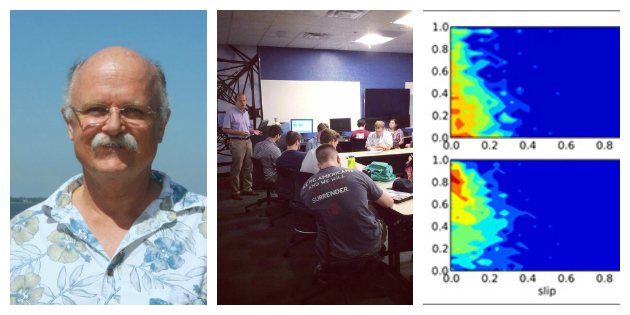The National Science Foundation (NSF) is awarding $31 million to researchers, including the College of Charleston’s Jim Bowring, to develop tools, infrastructure and best practices for data science.
RELATED: Learn about the data science major at the College.
Bowring, a computer science professor, is working with both undergraduate and graduate students at the College to develop cyberinfrastructure that will assist in the visualization and interpretation of data related to the timescales and rates of climate change, sea-level change, and volcanic activity. The data are in the form of dates obtained from uranium-series dating of carbonate samples in marine limestone and cave deposits.
“There is an incredible amount of legacy data available from uranium-series dating efforts, but no standards for processing the data nor for archiving the results,” Bowring explains. “We will be collaborating with geochronologists to create new algorithms and an open-source cyberinfrastructure that will allow for re-processing existing data as well as supporting new data-acquisition techniques. We will also create standardized methods for archiving data and results in searchable public databases. In short, we seek to improve how scientists understand time in the context of climate and environmental change.
Bowring and his team, which includes researchers from the University of Florida, the University of Hawaii, and the University of Kansas, will receive $570,000 over the next three years to conduct this research. The NSF funded a total of 17 projects in 22 states through the Data Infrastructure Building Blocks (DIBBs) program.
RELATED: Read the NSF article about the grants.
The NSF notes “many of the benefits of ‘Big Data’ have yet to surface because of a lack of interoperability, missing tools and hardware that is still evolving to meet the diverse needs of scientific communities.”
“This project is helping to break down the silos in science,” Bowring states. “Bringing together computer scientists and earth scientists is a great way to make a big impact in areas like climate change.”
For the past several years, Bowring has worked with students at the College of Charleston to create cyberinfrastructure through the NSF-funded project CIRDLES.org, which stands for Cyber Infrastructure Research and Development Lab for the Earth Sciences. The team has collaboratively developed cyberinfrastructure with earth scientists to support uranium-lead dating, and with this grant, will be extending and adapting this cyberinfrastructure to handle uranium-series dating.






